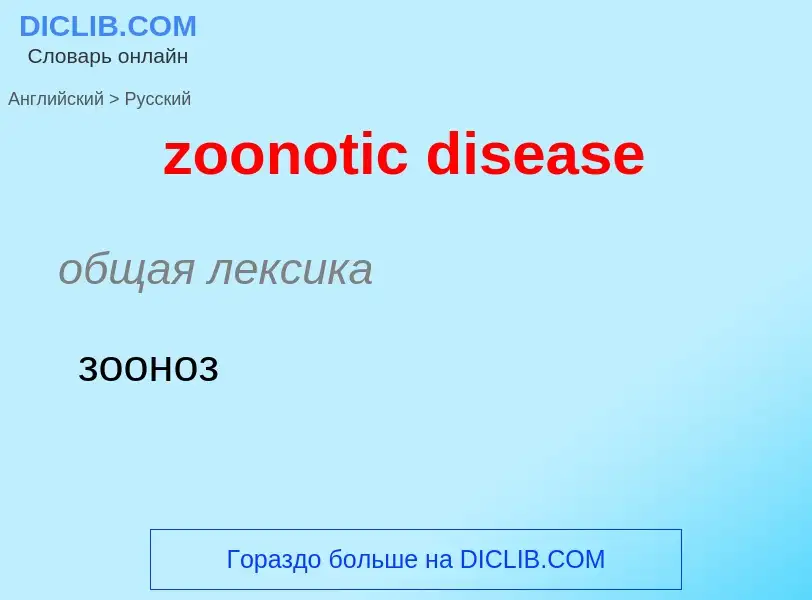Tradução e análise de palavras por inteligência artificial ChatGPT
Nesta página você pode obter uma análise detalhada de uma palavra ou frase, produzida usando a melhor tecnologia de inteligência artificial até o momento:
- como a palavra é usada
- frequência de uso
- é usado com mais frequência na fala oral ou escrita
- opções de tradução de palavras
- exemplos de uso (várias frases com tradução)
- etimologia
zoonotic disease - tradução para russo
общая лексика
зооноз
[zəu'ɔnə|siszəuə'nəu{sis}-]
общая лексика
зооноз
зооноз (инфекционное заболевание, вызываемое возбудителями, которые паразитируют в организме определённых животных)
существительное
общая лексика
зооноз (паразитарное заболевание животных)
болезнь
передаваемая от животного человеку
медицина
зоонозный
Definição
Wikipédia

A zoonosis (; plural zoonoses) or zoonotic disease is an infectious disease of humans caused by a pathogen (an infectious agent, such as a bacterium, virus, parasite or prion) that can jump from a non-human (usually a vertebrate) to a human and vice versa.
Major modern diseases such as Ebola virus disease and salmonellosis are zoonoses. HIV was a zoonotic disease transmitted to humans in the early part of the 20th century, though it has now evolved into a separate human-only disease. Most strains of influenza that infect humans are human diseases, although many strains of bird flu and swine flu are zoonoses; these viruses occasionally recombine with human strains of the flu and can cause pandemics such as the 1918 Spanish flu or the 2009 swine flu. Taenia solium infection is one of the neglected tropical diseases with public health and veterinary concern in endemic regions. Zoonoses can be caused by a range of disease pathogens such as emergent viruses, bacteria, fungi and parasites; of 1,415 pathogens known to infect humans, 61% were zoonotic. Most human diseases originated in non-humans; however, only diseases that routinely involve non-human to human transmission, such as rabies, are considered direct zoonoses.
Zoonoses have different modes of transmission. In direct zoonosis the disease is directly transmitted from non-humans to humans through media such as air (influenza) or through bites and saliva (rabies). In contrast, transmission can also occur via an intermediate species (referred to as a vector), which carry the disease pathogen without getting sick. When humans infect non-humans, it is called reverse zoonosis or anthroponosis. The term is from Greek: ζῷον zoon "animal" and νόσος nosos "sickness".
Host genetics plays an important role in determining which non-human viruses will be able to make copies of themselves in the human body. Dangerous non-human viruses are those that require few mutations to begin replicating themselves in human cells. These viruses are dangerous since the required combinations of mutations might randomly arise in the natural reservoir.


.jpg?width=200)
